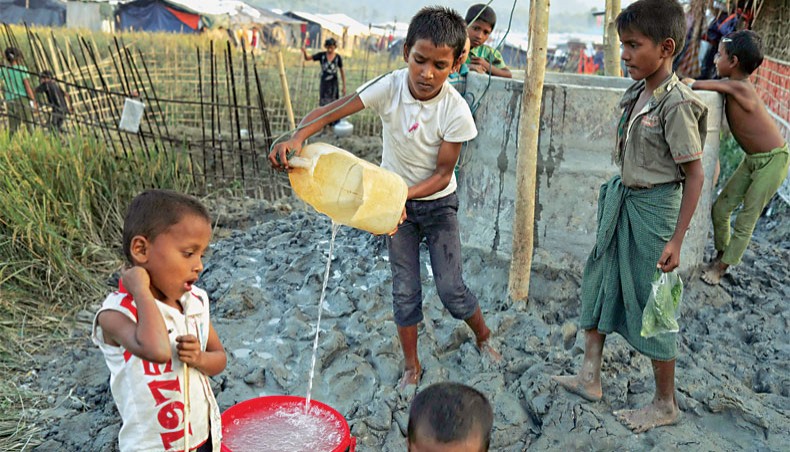Many Rohingyas face acute water crisis
Many Rohingyas entering Bangladesh to flee ethnic cleansing in Myanmar continue facing acute scarcity of safe drinking water in the makeshift camps and shelters.
Drinking water crisis for other Rohingyas having some safe water supply has also aggravated as the tube wells or handpumps set up in the camps are inadequate and one-third of them have become non-functioning, said international aid workers.
Government and international agencies have so far set up 5,338 handpumps against the estimated need of 7,700 for ensuring minimum safe drinking water for over 6.26 lakh Rohingyas taking shelter in Cox’s Bazar fleeing ethnic cleansing in their motherland, Rakhine State of Myanmar.
Local people fear a grave condition in future as the presence of over 6 lakh Rohingyas has put extra pressure on water sources and they have warned about severe water crisis in the later part of the winter when usually the groundwater level went down while overuse of existing water sources might send the water level further down.
In absence of safe water, many Rohingyas in different makeshift camps in Damdamia Nature Park, Jadimora, Alikhali, Unchiprang areas of Teknaf continue collecting water from ponds, waterfalls and others.
‘None is supplying drinking water for us. We collect water from a nearby pond,’ Rohingya community leader in Damdamia area Rashid Ullah said.
‘We are yet to reach all Rohingyas with safe drinking water facilities,’ said Cox’s Bazar refugee relief and repatriation commissioner Mohammad Abul Kalam.
According to the UN estimation till Monday, 6,26,000 Rohingyas have entered Bangladesh since the beginning of the new influx on August 25.
Officials estimated that the new influx already took to 10.45 lakh the number of documented and undocumented Myanmar nationals in Bangladesh entering the country at times since 1978.
Many Rohingyas erected makeshift shelters in reserved forests, felling trees, setting up shanties on hill slopes and some of them took shelter at overcrowded registered and unregistered camps.
These haphazard sprouting of camps made it hard for aid workers to supply safe drinking water to the Rohingyas, aid workers and public health engineering officials said.
They said that safe water for Rohingyas was not only important only for drinking but also for doing day to day household chores like cooking.
An Inter Sector Coordination Group, comprising of UN agencies and international aid workers working at Cox’s Bazar, situation report on Monday said that 30 per cent of the 5,338 handpumps installed in the camps had become non-functional.
‘Access to clean water and safe sanitation services is a problem for the communities hosting refugees in Cox’s Bazar,’ International Organisation Migration’s WASH programme manager Alessandro Petrone said in a statement on Tuesday.
Rohingyas living adjacent to Damdamia Nature Park said that at least 3,000 Rohingyas there were collecting water from a pond inside the park and six wells dug by them.
They said that aid workers set up a water tank in the area but no water was supplied to the tank.
Rohingyas in Jadimora area said that they were collecting water from tube wells or handpumps of local communities. On many occasions local people barred them from collecting water fearing that tube wells might go out of order.
At Unchiprang, Rohingyas are collecting water from a local waterfall making a dam.
Rohingyas living in different camps covered by the tube well networks are also facing problem as nearby tube wells have become non-functional. They said that they needed to collect water from others tube wells far from the makeshift camps.
Rahman at Damdamia said that they were collecting water from nearby hilly water streams but in this dry season those hilly streams dried out and now they were digging wells and collecting water from the ponds.
Department of Public Health Engineering officials said that Rohingays took shelter cutting forests and hills where usually Bangladeshi people did not live, so safe drinking water facilities like tube wells were absent in the areas.
Department’s executive engineer in Cox’s Bazar Mohammad Mosleh Uddin said that they had so far set up 2,200 tube wells and many of them went out of order mainly due to overuse.
‘We are not repairing non-functional tube wells as it requires a lot of money’ he said. ‘Rather we are planning to set up 600 deep tube wells,’ he added.
News Courtesy: www.newagebd.net











